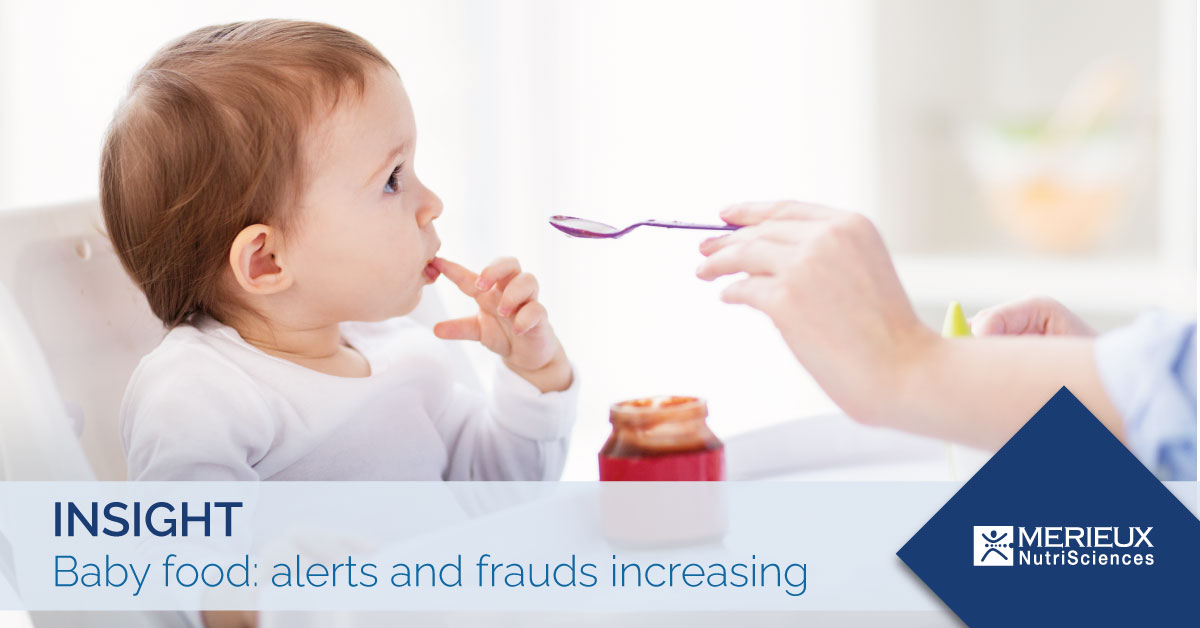BABY FOOD AND FOOD SAFETY: DANGEROUS ALERTS AND FRAUDS ARE INCREASING

WHAT ARE FOODS FOR INFANTS?
Foods for infants are foods intended for vulnerable people between the ages of 0 and 3 that provide essential nutrients for the proper development of the body and the immune system. According to Reg. (EU) No. 609/2013, they include:
- infant formula, intended for infants during the first 6 months of life, capable of fully satisfying nutritional requirements, until the introduction of an adequate complementary diet. It is the only product that can be used to replace breast milk.
- follow-on formulae intended for infants at a later stage after the first 6 months of life, which complements and supplements a progressively diversified diet.
- processed cereal-based foods and foods for infants and young children (baby food) which are useful for complementary and diversified nutrition.
- milk for growth (from 1 to 3 years), which is the milk component of a diversified diet.
They must be safe for consumption and strictly meet the specifications of quality, composition, labelling and limits for contaminants, as required by current legislation in continuous implementation and evolution (Reg. EU no. 609/2013, Reg. EU no. 127/2016, Directive n. 2006/125/CE, Reg. CE n. 178/2002, Reg. EU 1169/2011. Reg. CE n.2073/2005, Reg. CE n. 1881/2006, Reg. EU 1129/2011 etc.), because they are destined to be a segment of a very fragile population.
2021 NOTICES
Despite intensive official controls and stringent industry legislation, the year 2021 saw a worrying increase in alerts and fraud for these foods, unsafe and non-compliant for various reasons. The notices notified concern:
- Composition of the product: 24 alerts due to irregular content of bioavailable nutrients (proteins, fats, carbohydrates, minerals, vitamins, etc.).
- Physical contamination: 18 alerts due to the presence of foreign bodies such as glass, plastic, wood, stones.
- Regulatory requirements and labelling: 12 alerts due to a product non-compliance with regulatory requirements and with incorrect or missing labelling.
- Allergens: 7 alerts due to undeclared presence of allergens such as soy, milk, gluten and celery.
- Chemical contamination: 7 alerts due to the presence of pesticides, arsenic, chloroform.
- Poor hygiene requirements: 4 alerts due to non-compliance production processes and altered organoleptic properties of the products.
- Biological contamination: 3 alerts due to Salmonella and Cronobacter sakazakii contamination.
- Fraud: 1 alert due to theft and product adulteration.
The main food matrices involved by alerts and frauds are powdered milk and cereal-based foods, but also fruit purée and biscuits. Among the main countries of origin of unsafe and/or non-compliant food are the Netherlands, France, Italy, Belgium, Austria and China for the 60% of products, while the remaining 40% of them do not have a known origin (data source: Safety HUD).
Although all the safety issues and food frauds detected for these foods expose the weakest people to serious risks for the health, the presence of contaminants such as arsenic, pesticides, chloroform, Cronobacter sakazakii, allergens and foreign bodies is unacceptable and indeed worrying because their negative effects on the health of children or not, are immediate and/or fatal. In fact, it is known that:
- Arsenic, pesticides and chloroform are powerful, toxic and carcinogenic chemical agents, responsible for serious effects on the nervous and/or cardio-respiratory system, with fatal consequences on the health (source Efsa).
- Cronobacter sakazakii (Bacteria) is a dangerous biological agent responsible for meningitis, encephalitis, necrotizing enterocolitis, septicemia and death (source Efsa).
- Allergens are antigens (substances of plant or animal origin) responsible for disproportionate reactions of the immune system, capable of causing respiratory and cardio-respiratory problems, anaphylactic shock and death (source Efsa).
- Contamination of food by foreign bodies such as glass, plastic, wood, etc. is a very frequent incident responsible for many cases of death by suffocation, especially in the first three years of life (source Efsa).
HOW TO MITIGATE AND AVOID RISKS OF FOOD CONTAMINATION DURING THEIR PRODUCTION?
The production of foods for infants is one of the sectors of the food world that needs great attention, during every stage of the production process: from the supply of the raw material to the packaging of the finished product. To this end, a thorough and careful risk analysis and the compliance with good food manufacturing practices (GMP), throughout the entire production process, is essential. Among the main actions needed to produce safe and compliant food we have:
- Training and information of food sector operators about potential public health risks and potential contamination hazards of food production.
- Supervision of personnel during all stages of the production process.
- Supply chain control and accurate selection of incoming raw materials, which must meet the highest quality standards and must be properly stored.
- Sanitization and/or diversification of warehouses, production facilities, equipment and production lines.
- Adequate quality control with targeted, efficient and effective analytical plans.
- The careful execution of packaging and labelling of the finished product and the correct storage and transport of the same product.
However, the careful evaluation and management of all stages/parameters of the production process is necessary to ensure the success of the company productivity, avoiding border rejection, withdrawals and recalls of non-compliant products and to protect public health and its well-being.

